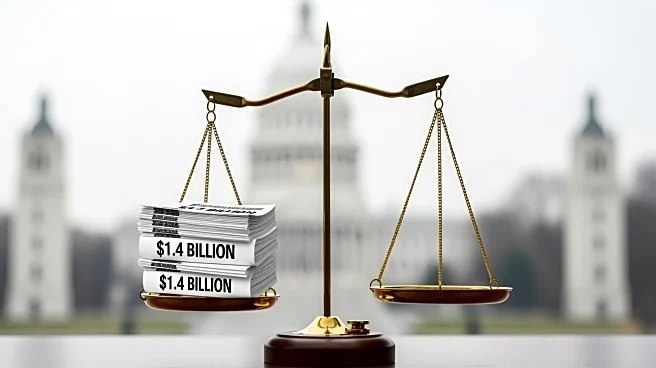What's Happening?
The Supreme Court has denied Alex Jones's request to overturn a $1.4 billion jury verdict against him for defaming families of Sandy Hook Elementary School shooting victims. Jones, the founder of Infowars,
was found liable in Connecticut and Texas courts for falsely claiming the 2012 shooting was a hoax aimed at promoting gun control. His accusations led to harassment of the victims' families by conspiracy theorists. Jones's attorneys argued that the verdict could lead to Infowars being sold to the satirical news site the Onion, which they claim would confuse his audience and undermine his message. The Supreme Court's decision not to hear the appeal leaves the verdict intact, and the potential sale of Infowars remains a possibility.
Why It's Important?
The Supreme Court's decision is significant as it upholds a substantial financial penalty against Alex Jones, reinforcing accountability for spreading false information and defaming individuals. This case highlights the legal consequences of conspiracy theories and misinformation, particularly when they result in harm to victims and their families. The ruling may deter similar actions by other public figures and media outlets, emphasizing the importance of responsible communication. Additionally, the potential sale of Infowars to the Onion could shift the platform's content, impacting its audience and the broader discourse on conspiracy theories.
What's Next?
With the Supreme Court's decision, the $1.4 billion verdict against Alex Jones stands, and the potential sale of Infowars to the Onion remains a possibility. This could lead to significant changes in the platform's content and audience engagement. The families of Sandy Hook victims may continue to seek restitution through the sale proceeds. Meanwhile, Jones's legal and financial challenges persist, as he faces bankruptcy proceedings in Texas. The broader implications for media accountability and the spread of misinformation may prompt further legal and regulatory scrutiny.
Beyond the Headlines
The case against Alex Jones underscores the ethical and legal challenges in balancing free speech with the protection of individuals from defamation and harassment. It raises questions about the role of media platforms in disseminating conspiracy theories and the responsibility of public figures to avoid causing harm through false claims. The potential transformation of Infowars into a satirical platform could shift public perception and discourse around conspiracy theories, highlighting the cultural impact of media ownership and content changes.









